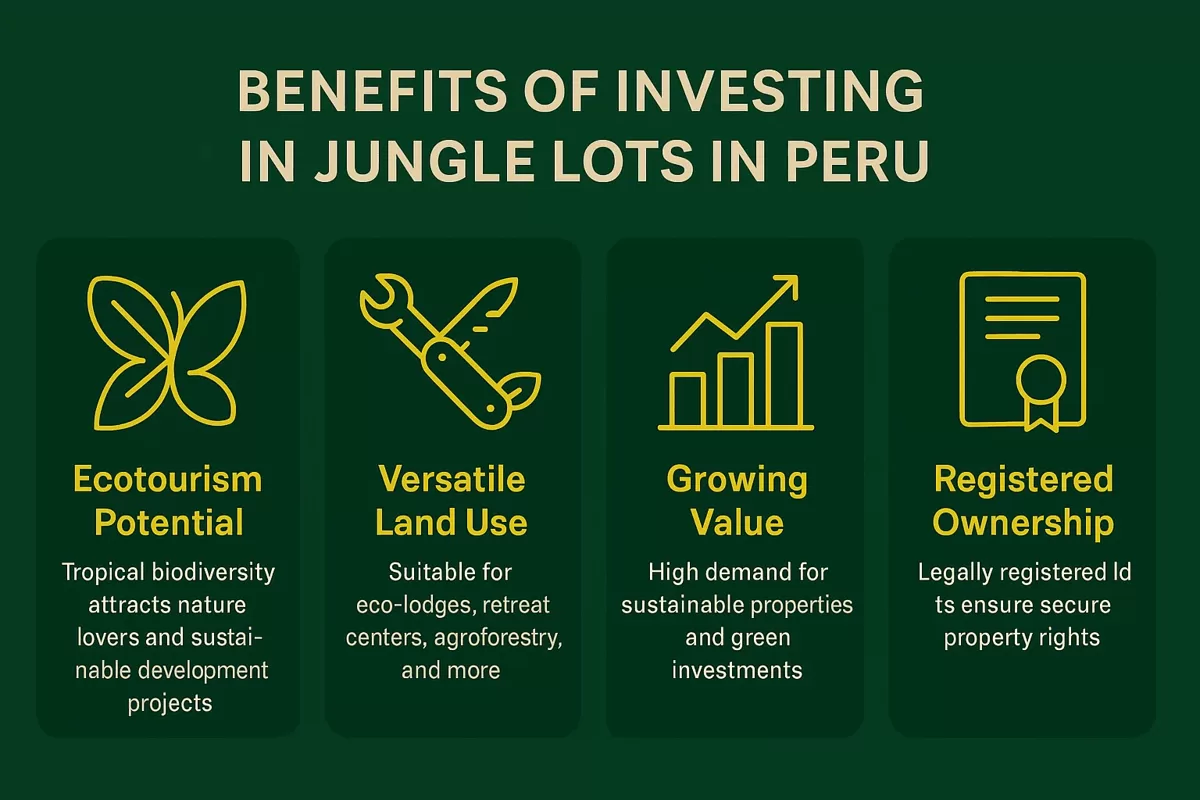Investing in Jungle Lots in Peru Benefits and Opportunities

Why Jungle Lots in Peru Are a Smart Investment Choice for 2025
The Peruvian Amazon pulses with a silent rhythm, a living melody that beckons those who seek to blend financial growth with a deep bond to nature. In 2025, jungle lots in Peru offer a unique opportunity to invest in one of the world’s most biodiverse regions while tapping into a stable and welcoming economy. Whether you envision an eco-lodge nestled among ancient trees, an organic farm yielding exotic fruits, or a sanctuary preserving the Amazon’s heartbeat, this land holds endless possibilities.
This guide explores the benefits, opportunities, and practical steps for investing in jungle lots, offering a clear path for eco-conscious investors, retirees, and nature enthusiasts. Dive into Peru’s investment landscape on our blog.
Key Advantages of Peruvian Jungle Land Investments
Biodiversity as a Foundation for Eco-Tourism Growth
The Peruvian Amazon teems with life—over 25,000 plant species, 4,000 bird species, and a vibrant array of wildlife make it a global treasure. This biodiversity drives a thriving eco-tourism sector, expected to grow by 15% annually in South America through 2030. Owning a jungle lot opens pathways to ventures like:
-
Eco-lodges and retreats for travelers seeking immersive nature or spiritual experiences.
-
Guided nature tours focused on birdwatching, botanical exploration, or indigenous culture.
-
Conservation projects that protect endangered species or restore ecosystems in partnership with NGOs.
Regions like Madre de Dios and Loreto, near national parks such as Manu or Pacaya-Samiria, are ideal for these initiatives. Explore the Peruvian Amazon’s flora and fauna.
Stable Economy and Investor-Friendly Policies
Peru shines as one of Latin America’s most stable economies, with a steady GDP growth of 4-5% annually and inflation below 3%. The government supports foreign investors through:
-
Equal land ownership rights for foreigners and Peruvian citizens.
-
Tax incentives for agricultural and eco-friendly projects in certain regions.
-
Bilateral investment agreements with over 30 countries to protect foreign investments.
This economic stability makes jungle lots a secure foundation for long-term growth, especially as global demand for sustainable real estate rises. Learn about Peru’s business environment.
Affordable Land for Diverse Investment Goals
Jungle lots in Peru remain remarkably affordable, with prices ranging from $1,000 to $5,000 per hectare, depending on location, accessibility, and title status. This low entry point allows investors to start with a small plot for a personal retreat or acquire larger parcels for commercial projects, offering flexibility unmatched by urban real estate markets.
Opportunities for Developing Jungle Land
Sustainable Residential Projects Rooted in Nature
Jungle lots are a canvas for crafting homes that harmonize with the Amazon’s spirit. Opportunities include:
-
Off-grid cabins powered by solar energy, designed to tread lightly on the environment.
-
Wellness retreat centers for yoga, meditation, or ayahuasca ceremonies, tapping into the global surge in spiritual tourism.
-
Community settlements for groups committed to sustainable, cooperative living.
These projects align with the growing trend of “jungle homes” that blend modern comforts with ecological mindfulness. Discover tips for building a jungle home.
Agroforestry and Organic Farming Ventures
The fertile soils of the Peruvian jungle are a fertile ground for sustainable agriculture. Profitable possibilities include:
-
Cacao and coffee plantations, capitalizing on Peru’s reputation as a leading exporter of organic products.
-
Exotic fruit orchards growing camu camu, soursop, or passionfruit for local and global markets.
-
Reforestation projects planting native trees to restore ecosystems and earn income through carbon credits.
These ventures offer financial returns while nurturing the land’s ecological balance. Learn about agricultural opportunities in Peru.
Conservation and Ethical Land Stewardship
Investing in jungle lots is a chance to contribute to global conservation. By preserving or restoring land, you can:
-
Lease land for carbon credits to organizations focused on climate solutions.
-
Establish private reserves to protect habitats for endangered species.
-
Collaborate with indigenous communities to support sustainable land use and cultural preservation.
These efforts enhance your land’s value while resonating with the growing demand for ethical investments. Read about Peru’s nature reserves.
Practical Steps for Buying Jungle Land
Securing Legal Ownership with Confidence
Ensuring a legally sound investment is essential. Reputable sellers, like those partnered with Weles Group, offer fully titled properties registered with SUNARP (Peru’s National Superintendency of Public Registries). Key steps include:
-
Verify the title through SUNARP’s online portal to confirm the land is free of liens or disputes.
-
Engage a Peruvian notary to formalize the purchase and ensure legal validity.
-
Check zoning regulations to understand any restrictions on development due to environmental protections.
Foreign investors enjoy the same property rights as locals, backed by Peru’s international investment treaties. Follow this guide to buying land legally.
Planning for Accessibility and Infrastructure
Jungle lots vary in accessibility, with some reachable by river, road, or small airstrips. Consider:
-
Proximity to urban centers like Iquitos or Puerto Maldonado for better infrastructure.
-
Off-grid utilities such as solar panels or rainwater systems for sustainable living.
-
Local resources for construction or project management to reduce costs and build community trust.
Careful planning ensures your investment aligns with your vision, whether for personal use or commercial development.
Honoring Cultural and Environmental Roots
The Peruvian jungle is a living tapestry woven with indigenous traditions and sacred practices, including ayahuasca ceremonies. To invest responsibly:
-
Consult local communities to respect their customs and needs before starting projects.
-
Use sustainable materials and low-impact designs to preserve the ecosystem.
-
Support community-led initiatives, such as reforestation or cultural preservation, to foster mutual respect.
This approach reflects the spirit of AYATUNE, honoring the jungle’s wisdom and aligning with global values of sustainability.
Challenges to Navigate in Jungle Land Investment
Investing in jungle lots requires awareness of potential hurdles:
-
Environmental regulations may limit development to protect the Amazon’s ecosystems.
-
Logistical challenges in remote areas can increase costs for construction or access.
-
Market fluctuations in eco-tourism or agricultural demand can impact profitability.
Mitigate these risks through thorough research, local partnerships, and diversified project goals. Learn the top 5 things to know before buying jungle land.
Embracing the Amazon’s Call through Thoughtful Investment
Investing in jungle lots in Peru is a journey into the soul of the Amazon—a chance to cultivate wealth while nurturing one of the planet’s most vital ecosystems. With its rich biodiversity, stable economy, and affordable land, Peru offers a canvas for eco-tourism, sustainable agriculture, or conservation projects. By approaching your investment with respect for the land’s cultural and ecological roots, you can create a legacy that echoes like a sacred melody.
Ready to answer the jungle’s call? Explore opportunities with Weles Group and deepen your understanding through our blog on sustainable living and investment.
Sources:
Learn more about our Peru business expertise /about-us/
Explore our jungle land investment opportunities /land-for-sale/
View our current sustainable projects
/projects/
View featured investment property /amazon-eco-retreat-peru-investment/
